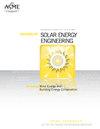Quonset型温室与薄膜光伏热系统相结合,与地气换热器相结合,在炎热和干燥的气候条件下的性能。
IF 1.9
4区 工程技术
Q3 ENERGY & FUELS
Journal of Solar Energy Engineering-transactions of The Asme
Pub Date : 2023-03-08
DOI:10.1115/1.4062097
引用次数: 0
摘要
本研究提出了一种Quonset型温室,该温室与薄膜光热(GiPVT)系统集成,用于在恶劣炎热的气候条件下种植作物。根据输入气候和设计参数,开发了一个周期性热模型来评估GiPVT系统的热性能。该模型基于GiPVT系统的能量平衡方程,计算给定气候数据(即太阳辐射和环境空气温度)的光伏屋顶温度、温室空气温度和植物温度。此外,确定GiPVT系统的热负荷水平,以评估系统封闭空间内的热舒适状态。结果表明,EAHE成功地降低了温室空气温度,提高了GiPVT系统内部的热舒适度。与0.5 kg/s的最佳流速相对应,植物和温室的最高温度分别降低了20°C和21°C。此外,目前的GiPVT系统每天产生29.22千瓦时的电能,使该系统具有自我可持续性。本文章由计算机程序翻译,如有差异,请以英文原文为准。
Performance of Quonset type Greenhouse integrated with thin film Photovoltaic Thermal system combined with Earth Air Heat Exchanger for hot and dry climatic conditions.
The present study proposes a Quonset-type greenhouse integrated with a thin-film photovoltaic thermal (GiPVT) system for crop cultivation in harsh hot climate conditions. A periodic thermal model in terms of input climatic and design parameters has been developed to evaluate the GiPVT system's thermal performance. This model is based on the energy balance equations of the GiPVT system, and it calculates PV roof temperature, greenhouse air temperature, and plant temperature for a given climatic data, i.e., solar irradiation and ambient air temperature. Furthermore, the thermal load leveling for the GiPVT system is determined to assess the thermal comfort status within the enclosed space of the system. The results indicate that EAHE successfully reduces greenhouse air temperature and increases the thermal comfort level inside the GiPVT system. Corresponding to the optimum flow rate of 0.5 kg/s, the maximum temperature of the plants and greenhouse is reduced by 20 °C and 21 °C, respectively. Moreover, the present GiPVT system produces 29.22 kWh of electrical energy per day, making the system self-sustainable.
求助全文
通过发布文献求助,成功后即可免费获取论文全文。
去求助
来源期刊
CiteScore
5.00
自引率
26.10%
发文量
98
审稿时长
6.0 months
期刊介绍:
The Journal of Solar Energy Engineering - Including Wind Energy and Building Energy Conservation - publishes research papers that contain original work of permanent interest in all areas of solar energy and energy conservation, as well as discussions of policy and regulatory issues that affect renewable energy technologies and their implementation. Papers that do not include original work, but nonetheless present quality analysis or incremental improvements to past work may be published as Technical Briefs. Review papers are accepted but should be discussed with the Editor prior to submission. The Journal also publishes a section called Solar Scenery that features photographs or graphical displays of significant new installations or research facilities.

 求助内容:
求助内容: 应助结果提醒方式:
应助结果提醒方式:


